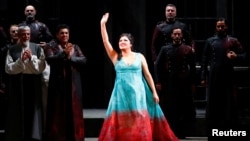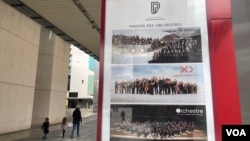Since Russia’s invasion of Ukraine in late February, Western nations have sidelined a raft of Russian artists, dancers and musicians with links to President Vladimir Putin. That includes star opera singer Anna Netrebko, who was dropped by the Metropolitan Opera in New York. Netrebko, however, is making a comeback of sorts with an appearance Wednesday night in Paris — underscoring a broader debate over the limits of cultural boycotts.
Soprano Liudmyla Monastyrska received a standing ovation starring earlier this month in Puccini’s Turandot. The Ukrainian singer took her curtain call at New York's Metropolitan Opera draped in her country’s flag.
Celebrated Russian sorprano Anna Netrebko was originally tapped for the role. But the war in Ukraine changed that. Netrebko has condemned the conflict, but not Russian President Vladimir Putin.
She publicly endorsed Putin’s reelection in 2012, although not in 2018. In 2014, she was photographed alongside a Russian-backed separatist leader from Ukraine’s Donbas region. She recently told Le Monde newspaper her intentions hadn't been political, and said she was uninformed about the area's history.
Now Netrebko is back on stage — singing at the Paris Philharmonic with another Russian, mezzo-soprano Elena Maximova. Beyond a last-minute appearance in Monaco, the event is considered her formal return to the Western stage.
The Paris Philharmonic declined an interview request. But in a statement, it said that while it has canceled artists formally linked to the Russian government, it aims to keep ties whenever possible with those who are not. After Netrebko’s criticism of the war, it noted, Russia’s Duma, the lower house of parliament, called her a traitor.
The Paris institution has a different position from the Metropolitan’s, where Netrebko will not be singing for the foreseeable future.
Russian singers aren’t the only ones under Western scrutiny. Dancers and other Russian artists are being boycotted for their ties to Moscow. It’s a very different situation from Cold War days, when artists from the United States and the former Soviet Union were often welcomed on each other's stages.
“The two superpowers were in a competition for hearts and minds the world over, and they were attempting to demonstrate to the world and to one another’s populations that theirs was the superior system,” said Kevin Platt, a professor of Russian and East European Studies at the University of Pennsylvania. “So from the perspective of each of the superpowers, it was their interest to showcase their culture and to engage their cultural exchanges.”
Today, it will be hard for Russia to overcome Western revulsion over its reported atrocities in Ukraine. Still, Platt is one who does not support a blanket boycott of Russian artists.
“My basic position on canceling and national identities is if you want to cancel people, cancel them because they are in support of the war, or aligned with this inimical Russian state or because their books and films are pro-war. Not because they are Russians, or their books are Russian,” he said.
That’s also the position of Ukrainian filmmaker Sergei Loznitsa, who spoke to France 24 TV at the Cannes Film Festival going on now. The festival has banned Russians with official ties to the Kremlin and slotted time for Ukrainian President Volodymyr Zelenskyy to speak at the venue via video link.
“Yet I do not agree with excluding those Russian authors, artists, filmmakers who are against this war, who are just like the rest of the civilized world — just trying to fight against the evil,” he said.
Loznitsa is not in lockstep with some of his compatriots who back a broader ban of Russian artists.
Meanwhile, the University of Pennsylvania’s Platt has his doubts about Netrebko’s operatic return.
“I think Ms. Netrebko has a prominent public voice," he said. "I would want her to see her using that voice far more vociferously to condemn this war and Putin’s dictatorial regime in the strongest possible terms — much more so than she has done — before welcoming her back into the limelight.”
The Paris Philharmonic has also welcomed Ukrainian musicians who fled the war in their homeland, It’s working with the head of the Kyiv Symphony Orchestra to place them in various French orchestras. Some have already performed in concerts in recent weeks.






